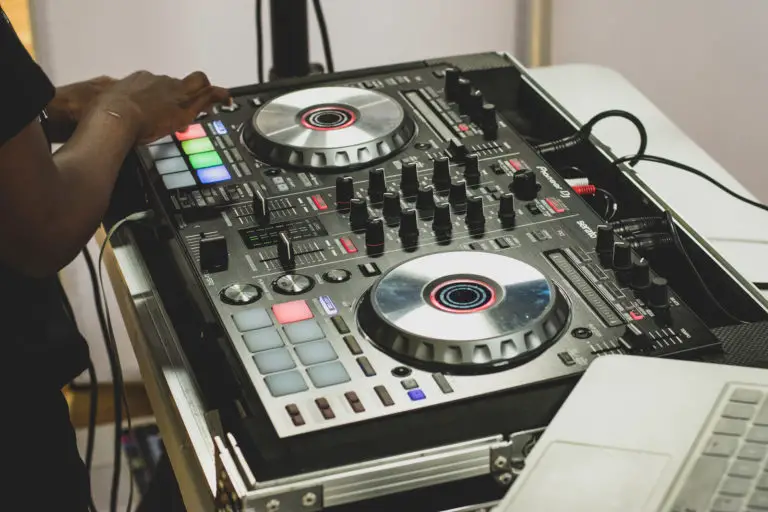Is a Music Degree Worth it?
When students think about whether a music degree is worth it, they often think about how their chosen academic path could open a career for them.
So, is a music degree worth it? It often breaks down into looking at the costs of studying, potential career paths, the subjects they learn, and how relevant they are to the modern-day.
Music degrees are changing. Classic structures based on traditional score-based theory slowly give way to courses based on how the subject can conform to modern standards. Each class will vary from institution to institution. Still, each degree will be the same – to give musically inclined students a chance to thrive.
Degrees no longer guarantee a job once someone graduates. Many music professionals don’t even have one. We’ll discuss both positions below.
Types of Music Degrees
Before breaking down the outcomes of what a degree can get someone, you have to look at the types of music degrees available to students today.
A simple music degree doesn’t exist as it depends on your school. Public universities will offer courses dedicated to business, production, and technology.
What are Public Music Universities?
Public universities give a much more grounded approach to music and look at all aspects of the industry – not just performances.
A quick scan of the leading courses shows what’s available to students with some of the most popular degrees, including:
- Performance – This degree field gives students everything they need to perform. Studies include vocal training, instrument specialization, and songwriting skills.
- Production – These courses look at the behind-the-scenes features of the music industry, such as producing/recording songs, mastering industry tech, getting lights, and rigging.
- Music Business – For those who want to enter the corporate side, such as record management, running tours, and finding how to scout new talent
- Music Education – Teaching others how to play instruments and pursue future musical careers.
Within these branches alone, there are plenty of career options for students to explore after their degrees.
These degrees cross over with other industries – such as tech or education – and give students skills that crossover into other sectors if they explore something else.
What are Specialist Music Universities?
There are entire schools and institutions dedicated to performing one particular strand for the more talented out there, allowing them to go from prospect to virtuoso in just a few short years.
Like The Julliard School, these schools are much harder to get into. However, they often give access to some of the best training available anywhere in the industry.
Of course, these places are not for the faint-hearted. These schools are for those wanting to reach the pinnacle of their careers. If you want a spot on Broadway or a symphony orchestra – these are the courses that someone needs to aim for to succeed. It’s here where performers will find classes broken down into much more specialist areas such as:
- Strings
- Percussions
- Brass
- Guitar
- Vocals & Opera
- Conducting
Getting a place in schools offering these courses is difficult, but they produce a much better chance of someone landing a spot in a famous institution once they graduate.
If anyone is lucky enough to get into one of these schools, they will undoubtedly find that they will have an excellent platform to move on to for a performance-based career.
The Cost of Music Degrees
As with any degree, paying the fees is certainly not cheap. Students will need to find ways to pay their tuition fees alongside finding places to live and sustain themselves during their course.
However, depending on where you study will also determine how much you pay. For example, public universities offering music courses will be cheaper than specialist schools.
Specialist schools and university costs can be astronomical for anyone who survives the selection process.
Thankfully, scholarships are in place – particularly at specialist schools – which can help students subsidize costs and live the dream of studying there.
How Music Degree Costs Vary By Location
Finding financial support often plays a big part in deciding if a music degree is worth it for many students. It’s why it is wise to look at studying costs everywhere. Everywhere means across the planet. Many countries will offer their national residents a “student loan” to help cover their fees each semester while at university.
It helps lower the overall costs of studying and allows students to wait until they are in full-time employment before paying the money back.
In some places like the USA, students can also receive grants such as Federal Student Aid to help cover the costs. The amount provided may vary depending on someone’s background and type of course.
With saying that, studying still isn’t cheap wherever you go in the Western World. A 2021 comparison showcased the vast difference between countries:
- USA: $26,290/yr
- UK: $25,000/yr
- Australia: $20,000/yr
- Canada: $20,000/yr
- Germany: $300/yr
- France: $3,400/yr
- China: $4,700/yr
- Russia: $1,300/yr
- Italy: $1,200/yr
These figures show that the costs can be expensive in many traditional western countries. The US and UK are the biggest offenders.
It’s not too surprising considering that many world-leading institutions are situated here. Prestige drives costs up. Some cheaper countries could provide similar results for those looking to break into the music industry. Fame isn’t everything.
Countries such as France, Italy, and Germany all have significant roles within the music industry. They could provide just as good prospects of a job as more expensive venues in established countries. Germany had three universities ranked in the top 50 of the 2021 QS University Rankings for Arts & Humanities.
Examples of the Top Specialist Schools
There is only one goal for many people who have their hearts set on performing – graduating from the best schools. These places are specialists in every sense of the world.
It’s why they cost so much to get into – provided you can get into them in the first place. If you graduate from these places, success will be sure to follow.
Top Specialist Music Universities
The Julliard School – New York, NY
Nowhere has a more prestigious reputation than The Julliard School of Music. It is seen as the crème de la crème of the industry. It’s notoriously hard to get into, but its alumni is a who’s who of industry greats. With dedicated courses from playing trumpets to harps, it is the place to be for anyone wanting a career in the theatre of performance arts.
The Royal College of Music – London, UK
In the heart of London, you will find the Royal Academy of Music – one of the oldest music schools in the world. Famed for producing leading musicians of almost every genre, it is a place where careers are made. With links to the London Symphony Orchestras, the famed West End, and many classic bodies, it remains one of music’s most prestigious schools.
Berklee College of Music – Boston, MA
Even though Boston’s Berklee College of Music is less than a century old, it always delivers for its students. Berklee gives students a great platform to launch into a contemporary setting by taking a more modern approach to the industry. With a high acceptance rate and over 250 Grammy Award winners in its alumni, students here always have a high chance of succeeding in music.
Conservatoire de Paris – Paris, France
Nowhere has a richer musical history than France, and the Conservatoire de Paris has been the hub for this for over two centuries. It may have a low acceptance rate (just 3%), but the education is second to none and opens doors to many famous concert halls. If someone wants a classic experience while studying, the French capital will provide it.
The University of Music and Performing Arts Vienna – Vienna, Austria
Vienna’s relationship with performing arts is timeless, as its University of Music. This specialist college has hosted famous composers such as Brahms and Strauss and provides excellent one-on-one tuition with its experts. The university almost always wins many top prizes in international competitions giving students an instant platform to succeed.
Moscow Conservatory – Moscow, Russia
Don’t let the location fool you – Moscow is one of music’s most significant hubs. The famed Moscow Conservatory has hosted many classic idols such as Tchaikovsky and Rachmaninoff and carries the legacy down to today’s students. It also has an extensive international intake of students and specialist prizes in no less than six categories.
How to Get Into A Music Degree Program
Getting into a music degree program involves meticulous preparation and a deep understanding of both music and the specific requirements of different universities or colleges. Below, we detail a pathway that prospective students can take to gain entry into a music degree program:
Researching Potential Schools and Programs
- Academic Requirements: Understand the academic prerequisites needed for different programs.
- Program Reputation: Consider the reputation of the programs you are interested in. Look into the faculty, alumni, and the kind of placements past students have received.
- Curriculum Overview: Get an understanding of what each program offers in terms of curriculum to see what aligns with your musical interests and career goals.
Preparing Your Application
- Personal Statement: Craft a compelling personal statement that narrates your musical journey and demonstrates your passion for the field.
- Recommendation Letters: Seek recommendation letters from teachers or professionals who can vouch for your musical abilities and dedication.
Developing Your Skill Set
- Music Theory: Gain a solid grounding in music theory, as this will be a crucial part of most degree programs.
- Instrument Proficiency: Ensure that you are proficient in your chosen instrument(s). Consider undertaking exams that certify your level of skill.
Building Your Portfolio
- Performance Recordings: Create high-quality recordings of your performances that showcase your skills effectively.
- Compositions: If you are a composer, including a portfolio of your original works can be a substantial asset.
Audition Preparation
- Choosing the Right Pieces: Select pieces for your audition that not only showcase your technical skills but also your emotional connectivity to the music.
- Rehearsal: Regularly rehearse to get comfortable with your chosen pieces, and be prepared to discuss your choices during the audition.
- Feedback and Critique: Before the audition, perform in front of friends, family, or teachers to receive feedback and make necessary adjustments.
Funding Your Education
- Scholarships and Grants: Research and apply for scholarships and grants available for music students.
- Financial Aid: Explore the financial aid options offered by the universities or colleges you are applying to.
Attending Interviews and Auditions
- Professional Attire: Dress appropriately for interviews and auditions to make a good first impression.
- Positive Attitude: Approach interviews with a positive and open mindset, showcasing not just your skills but also your willingness to learn and grow.
- Question-Answer Session: Be prepared for a Q&A session during the audition, where you may be asked about your music journey, influences, and aspirations.
What Do Career Prospects Look Like After Graduation?
The prospects vary for music graduates depending on their type of course and where they graduated from. Qualifications and the institution will get you so far but other careers also require more than just a degree.
This includes experience in the field. Combine both non-performing aspects and performing aspects within the industry itself. So what sort of careers are out there?
Music Technology
Music technology is the crux of where everything begins. So much of music comes from tech. There are plenty of jobs awaiting new graduates as they enter the workforce.
Almost all studios require engineers and producers to man the helm. That is where the lion’s share of the production work comes in.
Some studios may only need one produce or mixer. The bigger ones will have multiple roles and internships offered.
Outside of studios, media companies are also big employers for anyone versed in production. You can also get a job in film or radio. There is always a need for music producers and that will only increase as technology increases.
Music Management
The role of managers in music has changed over the years. Still, bands and record labels still require staff to find and run their talent. For many who have studied the music business, this is the perfect way to break into the industry. It might not be glamorous at the start, but it opens up some huge stories.
Meeting the right person unwittingly is a stumbling block to the next big thing. You can also land in managing tours, seeing the true story behind what happens on the road.
Music Teacher
Many music graduates come out with enough knowledge to pass it on to the next generation. Schools are always in need of teachers. Music teachers are often in short supply meaning that jobs won’t be hard to come by!
Mixing music knowledge with creative performances gives music teachers the joy of variety. This same joy of learning and teaching might not find in more specialist roles.
Teachers aren’t always confined to schools. Anyone skilled in a particular instrument can also go it alone and teach it to the next generation. Starting a from-home or online workshop isn’t out of the question.
Performing Artist
For those who have dedicated their lives to their craft, being a performer is all that matters. It can happen as soon as you graduate or even during the course.
It’s a path that is tailor-made for anyone coming out of the top specialist schools. There are many opportunities for someone to invest in.
You can also join stage companies as part of a band. Being in a famous venue with a fixed spot provides great consistency. You can also join a touring group or orchestra and enjoy a life of playing to crowds all year round. Many top performers believe that all the hard work was worth it.
Alternatives to a Music Degree
In a rapidly evolving world, the paths to becoming a proficient and successful musician are as diverse as they are exciting. While a music degree can provide a structured pathway to a career in music, it’s far from the only route. Let’s delve deeper into the viable alternatives that prospective musicians can consider.
Online Courses and Tutorials
The digital age has brought about an educational revolution, offering learning opportunities that are both flexible and affordable. Aspiring musicians can now learn from masters in the field from the comfort of their homes, through platforms such as Masterclass, Coursera, and YouTube.
Online courses can range from beginner to advanced levels, offering certifications and even degrees in music. Tutorials allow students to learn at their own pace, revisiting material as needed and taking time to hone their skills through practical exercises. Furthermore, the wide array of subjects available means that students can tailor their education to suit their interests and career goals, whether it be in performance, composition, production, or music theory.
Self-Teaching
With dedication and discipline, self-teaching can be a fulfilling and successful route to musical proficiency. The vast array of resources available today, from instructional books to video tutorials, means that students have all the tools they need at their fingertips.
Self-teaching allows for a customized learning pathway, where one can focus intensely on areas of personal interest. Moreover, it fosters a strong sense of self-discipline, as learners must motivate themselves to stick to a regular practice routine. The joy of self-discovery and the ability to learn from one’s mistakes can be deeply gratifying, allowing for a unique, self-tailored educational journey that is as individualized as it is flexible.
Apprenticeships and Mentorships
For those looking for a more hands-on approach to learning, apprenticeships and mentorships present a golden opportunity. Apprenticeships often allow learners to gain practical experience while working alongside experienced professionals, offering a glimpse into the daily workings of the music industry.
Mentorships, on the other hand, provide guidance, feedback, and networking opportunities that can be invaluable for career progression. Finding a mentor who can guide one through the intricacies of the music world, share their experiences, and offer advice can be a cornerstone in a budding musician’s development.
Working under the wing of a seasoned musician not only facilitates skill development but offers real-world insights into the music industry’s realities, helping novices navigate their careers strategically and avoid common pitfalls. This immersive learning approach fosters a rich understanding and practical knowledge, often forming the bedrock for a fruitful career in music.
So is a music degree worth it?
The music industry is a vast landscape to try and conquer. it needs someone to truly know what they want to do. Prospective students need to do their homework. Finding out what you want to do lets you decide your path.
There are some tough aspects to gaining a music degree though. Studying is never going to be cheap no matter where you go. Anyone going overseas to study will expect to pay even more if they aren’t careful.
Furthermore, specialist music schools are extremely tough to get into. Expect very low intakes each year and tough selection processes. However, the lucky few who do get in are almost always successful once they graduate.
Upon graduating, students need to research their roles carefully and seize any opportunities that come their way. This is important whether it be through placements, internships, or fully-fledged jobs.
Of course, skills developed in music degrees can be transferred over to other industries too such as education, admin, or the media. So even if it feels like a waste, these skills are transferable
That’s why people should people still pursue their music dreams at university. Even if they don’t end up in the industry as they realize they can still say yes no matter what they are doing.








